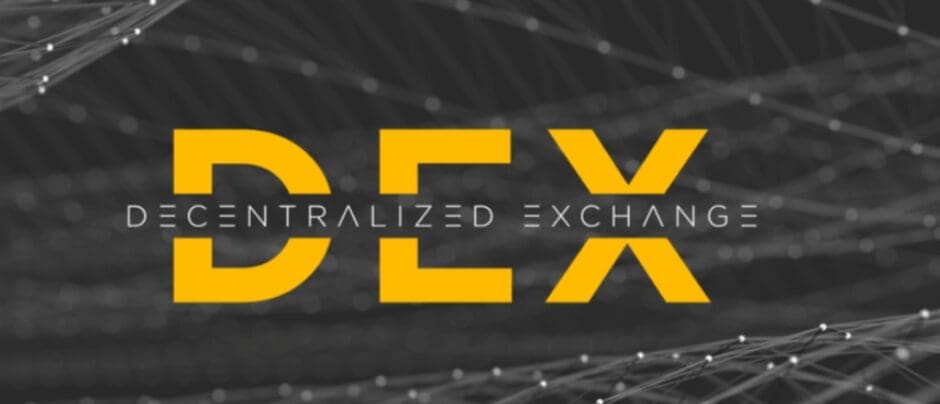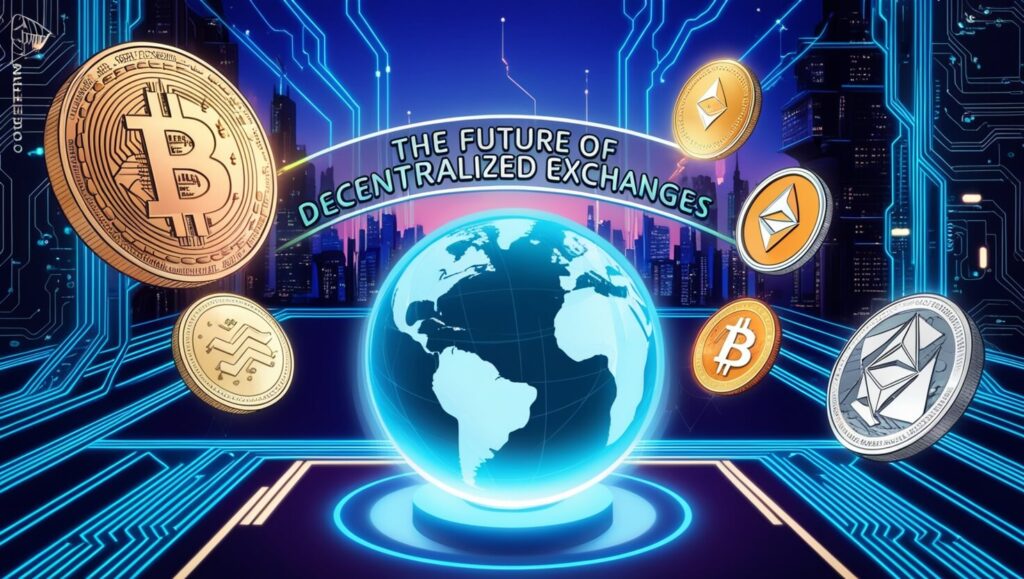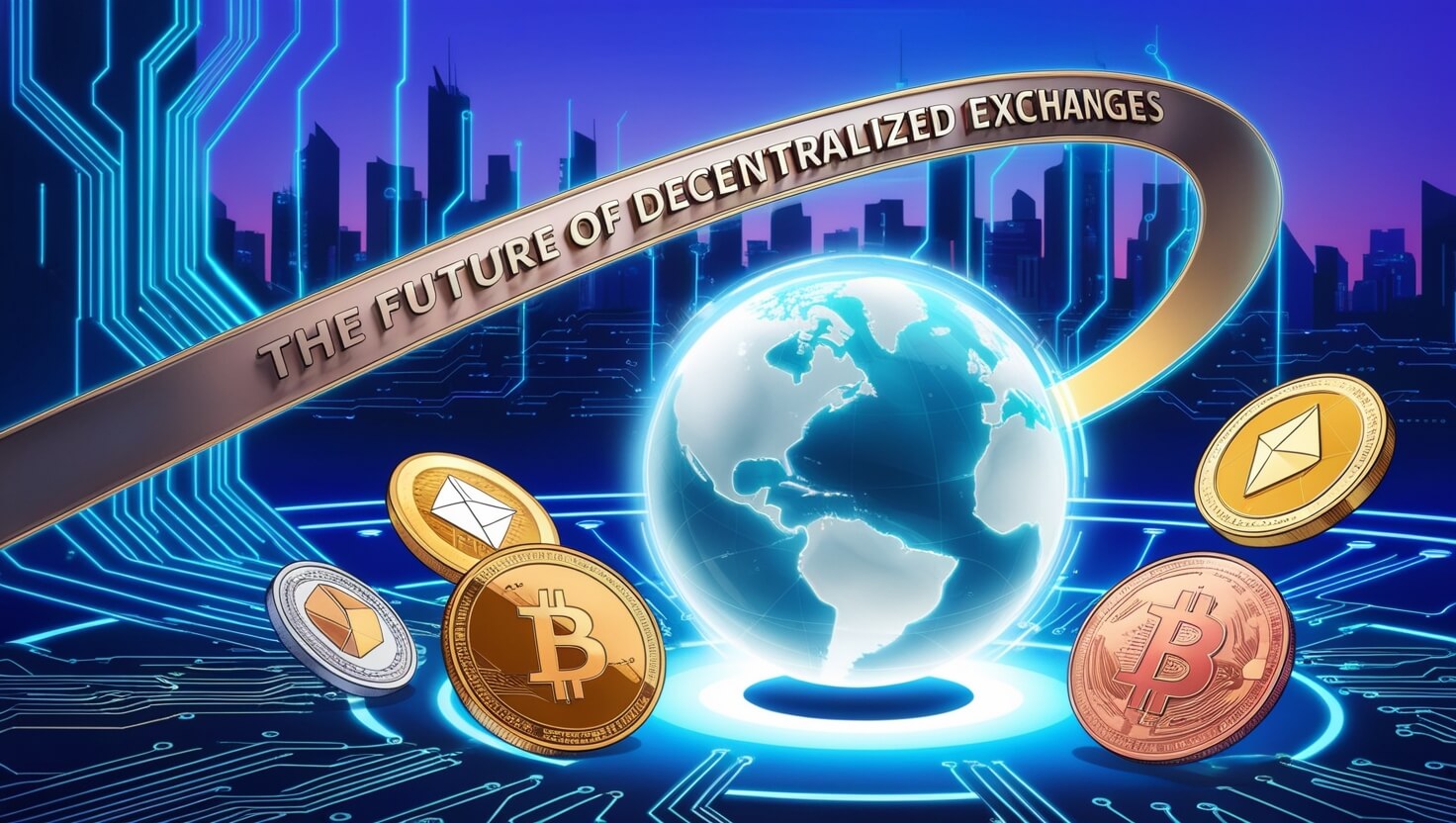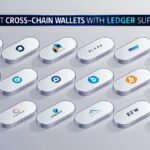In this article I will analyze the future of decentralized exchanges (DEXs) and their impacts on digital trading. Thanks to DEXs incremental developments in blockchain technology, they are solving issues like scalability, regulatory obstacles, and are positioning themselves as critical participants in the global financial systems.
What Is Decentralized Exchanges?
A decentralized exchange (DEX) is a digital platform based on blockchain technology that allows users to exchange cryptocurrencies directly with one another without the involvement of any third parties or intermediaries.
Unlike their counterparts, DEXs operate through smart contracts which allows for self-custody of assets. These exchanges do away with the involvement of a third party which helps mitigate issues such as hacking, censorship, and fraud.

Uniswap and PancakeSwap are famous examples of DEXs that trade using automated market maker (AMM) models or order book systems. DEXs provide more privacy and control at the expense of liquidity, higher transaction fees, and a more complex interface than centralized exchanges.
The Future Of Decentralized Exchanges

The gap that still exists in DeFi is continuously being filled and adapted to irrespective of the challenges faced and this is only possible due to constant advancement in blockchain technology.
As the industry continues to grow and incorporate scalability solutions, DEX platforms are expected to increasingly play an integral role in the international financial system, as they offer a much more secure, open, and censorship resistant option than traditional exchanges.
What’s Fueling the Rise of Decentralized Exchanges?
With the increased concern towards centralized exchanges, traders are moving to DEXs. In DEXs, there is no need for trust due to mismanaged security breaches and worked restrictions within the platform. In addition, DEXs seek to cater demands for enhanced user privacy, self-custody, and control.
At the same time, innovation within the DEX ecosystem has made these platforms more attractive. The invention of automated market makers (AMMs) and liquidity mining, as well as trade volumes, has made it easier for individuals to convert their digital assets.
These improvements allow traders and liquidity suppliers to take part in the worldwide market at any time without any restrictions.
Nonetheless, despite the convenience they offer, DEXs have their obstacles. Many traders are starting to adopt participation but are fearing losing autonomy whereas others do not enjoy the higher fees, slow speed, and difficult interfaces.
Types of Decentralized Exchanges
Decentralized exchanges (DEXs) have three core subdivisions; these are: Automated Market Maker (AMM), order book DEX, and DEX aggregators. All of them utilize smart contracts that enable direct peer-to-peer trading without third-party interference.
The first DEXs operated on an order book model, just like centralized exchanges. But new models have been developed to improve efficiency and liquidity DEXs.
1. Automated Market Makers (AMMs)
DeFi trading was transformed by AMMs after the replacement of actual order books with liquidity pools. The latter are supplied by users who, having put in their token pairs, receive transaction fees.
Instead of matching individual buy and sell orders using an order book model, AMMs utilize algorithms for setting asset prices based on the supply and demand. To ensure price feeds are accurate, blockchain oracles are used.
This segment is increasingly dominated by Uniswap, SushiSwap, and PancakeSwap that allow users to swap tokens without barriers. They also have to deal with particular problems like slippage, which occurs when there is insufficient liquidity.
Liquidity providers grapple with impermanent loss, which refers to how price fluctuations undermine their deposits. Still, over time, the fee earnings greatly outbalance the potential losses.
2. Order Book DEXs
Similarly to a centralized exchange, an order book DEX uses an order book to list commands to sell or purchase a stock. However, the trades are made using smart contracts. Loopring and dYdX are some of the prominent examples.
The order books can be both on-chain or off-chain. On-chain systems save every order detail to the blockchain while off-chain systems perform the transactions on the blockchain but save order details to a separate server for cost efficiency and speed.
Some of the order book DEXs may also provide margin or leveraged trading whereby clients may borrow money to improve their trading position. On the other hand, the liquidity shortages and the vulnerability to smart contracts makes them less attractive than centralized options.
3. DEX Aggregators
In order to alleviate the slippage or px difference between the DEX’s bid/ask, DEX Aggregators use several DEXs to obtain the fullest amount of liquidity. Most platforms DEX will first compare rates of different DEX. This increases transaction rate while decreasing failed transactions. Some of them support merging with CEXs and grant users the ability to fully possess their properties.
With the combining of liquidity pools and improving trading execution, DEX Aggregators ensure better user experience. Their main benefits are more efficient price calculations, less unnecessary spending, and better trustworthiness.
The Comparing Decentralized and Centralized Exchanges
| Feature | Decentralized Exchanges (DEXs) | Centralized Exchanges (CEXs) |
|---|---|---|
| Control & Ownership | Users retain full control of funds, trading directly via smart contracts. | Users deposit funds into the exchange, giving up direct ownership. |
| Security | Less prone to hacking since users hold private keys and funds. | Higher risk of breaches as funds are stored in centralized wallets. |
| Privacy | Allows anonymous trading without identity verification. | Requires KYC and AML verification, reducing privacy. |
| Liquidity | Can be lower, leading to slippage; improving with more users. | Typically higher liquidity with centralized order matching. |
| Regulation & Compliance | Operates in a regulatory grey area, with rules varying by region. | Subject to strict regulations, including AML and KYC requirements. |
Advantages of Decentralized Exchanges
You Can Control Your Funds
Unlike other trading platforms, one of the biggest advantages is that in DEXs there is self-custody. This means you remain in full control over your funds.
In a DEX, users trade assets from their owned crypto wallets instead of from an exchange…Unlike CEXs that store assets in exchange wallets and are prone to hacking, frozen accounts or mismanagement, DEXs mitigate these risks.
Enhanced Privacy and Fewer Barriers
Most platforms do not require the collection of extensive personal data. There are no long KYC procedures like on traditional platforms. All that’s needed is a wallet address. This helps users pass regulations efficiently either in restrictive regions or in privacy valuing areas.
Open and Permissionless Access
Users in any country can access DEXs provided there is internet connectivity. This feature is beneficial for those in developing countries or users facing restrictions from traditional platforms. Unlike centralised exchange which limit access depending on the user’s region.
Increased Security Through Decentralization
With no centralized servers to store information and no funds from users to operate, DEXs prove to be difficult targets for hackers. Many DEXs operate on open source smart contracts so users can inspect the code and fix any issues. This decentralizes trust and improves transparency which is particularly important for traders engaging in high value transactions.
Earning Opportunities Through Liquidity Provision
Apart from providing a new source of users, DEXs also allows them to earn income by refreshing assets on the platform.
Using liquidity pools, traders can provide assets and get a percentage of the transaction fees from swaps within the pool. This model is advantageous to both the traders and liquidity providers, which helps to make trading more sustainable and decentralized.
Advancements Steadily Propelling the Development of DEXs

The scope of DEXs is broader than just performing repairs; it aims to create new opportunities. Changes in the blockchain technology and market are transforming how decentralized exchanges work.
Layer 2 Scaling Solutions
Optimistic Rollups and zk-Rollups are rapidly lowering the expenses for cryptocurrency exchanges. Taking transactions off the primary chain and moving them off for processing enables speeding up the transactions substantially. This high volume, low-effort structure for DEXs means easily accessible trading crypto and derivatives on DEXs.
Cross Chain Interoperability
Many Decentralized exchanges limited their offerings to one blockchain network. Platforms like Thorchain and Wormhole are breaking that pattern by allowing seamless exchanges between multiple blockchains. We can now make trades across varying platforms without needing to switch platforms for assets based on the building.
Better Tools for Market Creation
More advanced methods for DEXs DEX’s such as self managing automated market makers (AMMs). Industry leading Uniswap V3 created tools which allow private liqidy issues to freely adjust their capital and opt out of set price boundaries. This allows market makers greater strategic options, as they do not have to be as capital intensive for improved earnings.
Models of Order Books That Are Not Centralized
For instance, dYdX and Serum, which are order book based DEXs, have started to integrate some of the advantages of decentralization, while also providing the speed of centralized platforms. These models are designed to appeal to traders from more conventional exchange backgrounds by providing sophisticated features for crypto derivative trading and self-custody DEXs for high-speed trading.
Automation and AI
The use of AI technology as well as AI analytic has already started to penetrate this space. These technologies can assist traders in executing specific strategies, handling risk, and even managing liquidity automatically. For market makers, as well as for traders in crypto derivatives, this precision is essential.
Challenges for DEXs (Decentralized Exchanges)
There is a broad array of peculiar issues surrounding decentralized economies. For example, traders, liquidity providers, and developers have challenges with limitations that seem to be barriers to DEX adoption. Here are a few of the consequences the decentralized exchange world lacks.
Scalability Issues
If you have tried swapping tokens during the peak market activity, it is highly likely that the fee charged was exorbitant. There was an Ethereum-based DEX fees. DEXs work on blockchains which creates congestion that translates to inefficient and expensive trading for active traders. Even those engaged with crypto derivatives face the same heat.
Scalability issues surrounding optimisitc and zk-rollups, though bleak, create smaller, easier to traverse obstacles for the user through integration of increased transaction speeds and reduced fees.
Removing the barriers to entry for smaller audiences requires improving the resources available, simplifying the overall interface, and making the entire system more accessible.
Liquidity Issues
The level of liquidity available on multiple exchanges is not scalable. For example, Uniswap and PancakeSwap feature users with large trading capacity, but smaller exchanges usually suffer from lacking market makers. And with low liquidity on trades, comes high slippage which causes larger trades to become inefficient and expensive.
To resolve the slippage problem some DEXs have come up with liquidity mining programs which reward users for increasing their liquidity. These incentive based solutions do not resolve the issue of liquidity farming and further work is needed.
Uncertain Regulations
Even though they are incentive based, DEXs are not free from the gaze of regulators. The international community is struggling to find an appropriate means of controlling DeFi while still promoting innovation. The trading of crypto derivatives is one area that attracts much more attention from regulations because of the higher risks involved.
A few DEXs are building tools for compliance in an attempt to meet their users needs, while at the same time deal with regulations. The problem with overregulation is driving users away, while underregulation leads to legal issues.
Smart contract Risks
The introduction of smart contracts mark a significant milestone, but the security risks associated with DEXs is a crucial concern.
Systems flaws and intrusions in DeFi protocols have previously resulted in enormous losses, making certain traders skeptical towards new platforms. Although leading DEXs are periodically audited, some loopholes may remain, making it critical for businesses to constantly improve their security.









